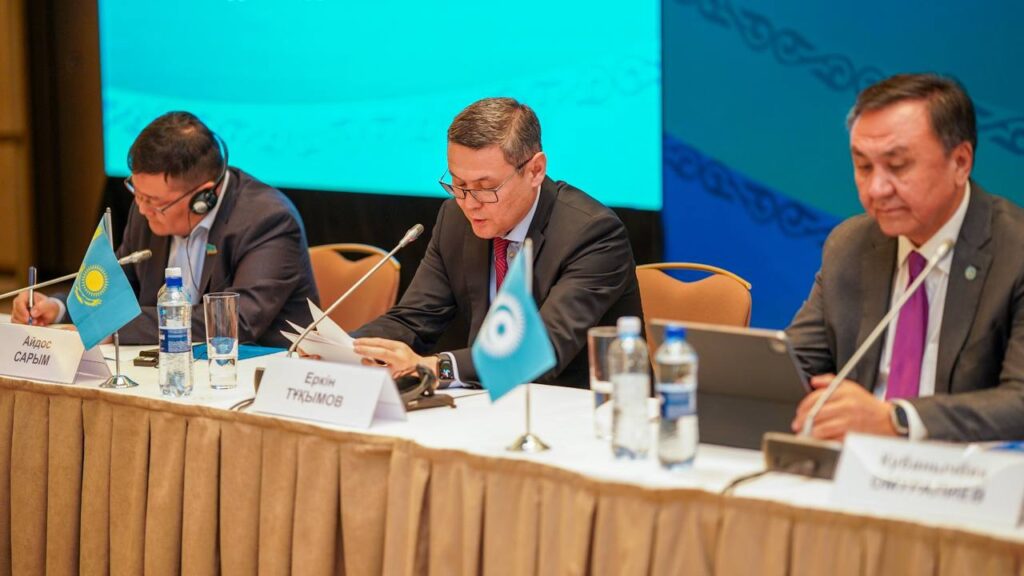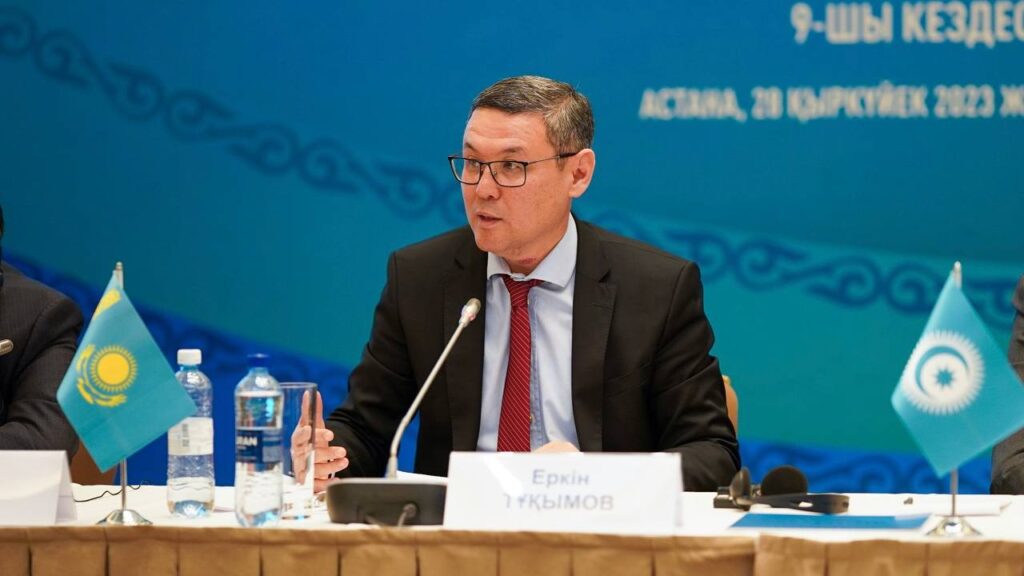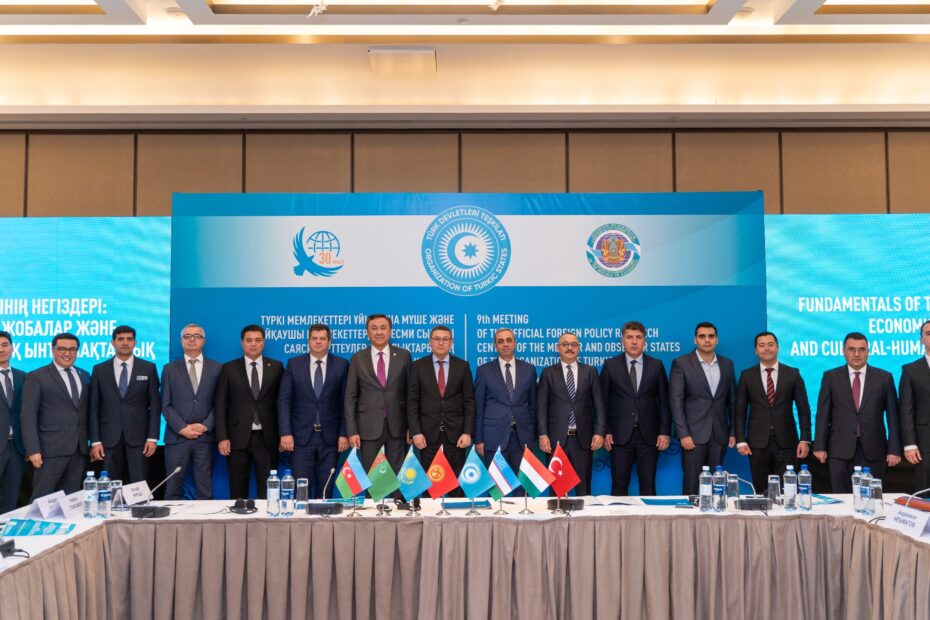The Kazakh capital hosted the Meeting of the Official Foreign Policy Research Centers of the Member and Observer States of the Organization of Turkic States (OTS) themed “Turkic States’ Cooperation: Building Bridges in a Turbulent World” on 28 September 2023. The event was organized by the Kazakhstan Institute for Strategic Studies under the President of the Republic of Kazakhstan and the Ministry of Foreign Affairs of the Republic of Kazakhstan.
Secretary General of the Organization of Turkic States Kubanychbek Omuraliyev and Director of the Kazakhstan Institute for Strategic Studies under the President of the Republic of Kazakhstan Yerkin Tukumov made welcoming speeches.
Opening the event, KazISS Director Yerkin Tukumov said: “We meet today on the eve of a historic event – the 10th anniversary summit of Heads of State of the OTS. Over the years of development of the organization our countries have become closer not only in the issues of cultural and civilizational cooperation, but also in the general understanding of the role and place of the Turkic world in the international arena”. Yerkin Tukumov emphasized that Turkic states set similar goals for themselves – preservation of security and stability, growth of citizens’ welfare, as well as harmonious promotion of national and cultural identity.
“The transformation of the Turkic Council into the Organization of Turkic States demonstrated the deepening of our cooperation. This marked a new milestone in the shared history of our countries, as we set strategic goals aimed at deepening the economic cooperation and enhancing the transportation connectivity,” he added. Also in his speech, head of KazISS elaborated on the strategic document “Perspectives of the Turkic World-2040”. Work on it and development of a clear action plan is still to come. “Kazakhstan, which historically stood at the origins of OTS, aims to stimulate further development of economic ties between the member countries. The main interests of our country are the development of innovative economy and diversification of transport corridors,” he added.
According to Secretary General of the Organization of Turkic States Kubanychbek Omuraliyev, the OTS supports multilateral relations between the states in all areas – from industry to tourism. The Secretary General stressed that the Organization’s strategy until 2026 envisages deepening cooperation between the member states. “The Trans-Caspian International Transport Corridor is also becoming the safest and shortest trade route between Europe and Asia. To increase its efficiency, we need to synchronize customs policies between the countries through whose territory the new trade routes pass,” he concluded.
Secretary of the Committee on International Affairs, Defense and Security of the Mazhilis of the Parliament of the Republic of Kazakhstan Aidos Sarym noted that the meeting of think tanks is held at an important moment. “Just the other day the Agreement on the establishment of the Turkic Investment Fund was ratified in Kazakhstan. I am confident that its activities will play a significant role in the economic development of Turkic states,” he said.
Thus, the speakers of the plenary session “Cooperation of Turkic countries in an age of distrust: regional model analysis”, represented in the majority by the leadership of think tanks, shared their vision of ways to strengthen cooperation between Turkic countries at the present stage.
They stressed that the space where the member countries of the Organization are located today borders on a number of civilizational and geopolitical fault lines, which makes cooperation and dialogue between the countries even more important. The participants of the plenary session also called for strengthening interstate relations, as well as for the development of coordinated strategies to address pressing issues.
The plenary session was devoted to the analysis of modern international and regional challenges in the field of security, as well as key areas that are in the focus of Turkic cooperation – economic projects and cultural and humanitarian cooperation.
Representatives of think tanks at the session “Cooperation of Turkic countries in an age of distrust: regional model analysis” presented their views on new opportunities for cooperation between Turkic states to counter transboundary threats and challenges.
The participants of the second session proposed a number of concrete steps and recommendations to strengthen ties in different sectors of the economy. Reviewing the economic and trade opportunities of Turkic countries, the speakers paid special attention to projects in the fields of energy, transportation, agriculture, and infrastructure development.
Nuh Yılmaz, Chairman of the Center for Strategic Research of the Ministry of Foreign Affairs of the Republic of Türkiye, noted that the Organization of Turkic States has undergone significant changes and transformation since its establishment. “The OTS has succeeded on its way to becoming an organization capable of effective decision-making. Now the Turkic world is at the center of important world trade routes. The OTS is a credible structure to capitalize on these opportunities. There is a need for integration of economies that will contribute to the development of the welfare of our countries,” he added.
Kanatbek Aziz, Director of the National Institute for Strategic Studies under the President of the Kyrgyz Republic, speaking at the session, said: “The common cultural code of the Central Asian countries is the foundation of the OTS. We have intensified cooperation in the region in all directions, and it is important for us to hear and listen to each other. In this context, the Turkic project can become a promising model of cooperation. For this purpose we need to create 2 research centers: on Central Asia and on relations with Türkiye. We need programs for regional integration projects and appropriate training of analytical staff”.
Chief Executive Officer of the Hungarian Institute of International Relations Marton Schöberl said: “Hungary is striving for a stronger union based on powerful states, and the Organization of Turkic States is a good example. I can assure you that Hungary is very interested and committed to cooperation within the OTS, as is our institute. Our presence goes a bit beyond international cooperation because it also includes our kinship and friendship.”
Akramjon Nematov, Deputy Director of the Institute of Strategic and Interregional Studies under the President of the Republic of Uzbekistan, said: “We need to achieve a strategic breakthrough in the economic direction, turn the territory of the CTG into a space of new economic opportunities, strengthen interconnectivity, develop cooperation in the spheres of trade, transportation and industrial cooperation. For the realization of plans in the sphere of economy, trade and industrial cooperation, it is important to ensure security. In this regard, it is important for us to closely coordinate security interactions.”
Shiri Shiriyev, Director of the Center for Strategic Studies of the Institute of International Relations of Turkmenistan’s Ministry of Foreign Affairs, noted in his speech: “The Organization of Turkic States today is a reputable international organization with great potential and opportunities. The attractive effect of the Organization of Turkic States in the world is due to the fact that, firstly, the Organization is not a political or military alliance. It is based on the commonality of historical roots, culture, coincidence of trade and economic interests. Secondly, the OTS provides a good opportunity for investment activities, technological exchange, and human capital development. Thirdly, the geographical space of the OTS allows to effectively use its trade and transit opportunities: it is possible to create a whole infrastructure of “hubs” in the OTS states located at the nodes of East-West and North-South transport corridors”. Shiriyev also added that the expansion of cooperation contributes to the rapid and cost-effective transportation of hydrocarbon resources to consumer countries.
Head of Department of the Center for International Relations Analysis of the Republic of Azerbaijan Javid Valiyev emphasized the need to further deepen cooperation between the OTS countries. “Each member of the OTS should be a respected partner of the region and the world. We should take the side of cooperation. The OTS should gain prestige globally and also be considered as a regional institution,” he added.
The issues of humanitarian cooperation promoting understanding and trust between the countries were also touched upon. According to experts, the exchange of experience in the fields of education, art and culture will help to significantly expand the development potential of the member countries.
It should be noted that our country, which stood at the origins of the Organization, attaches special importance to the rapprochement of Turkic states. Today Kazakhstan consistently pursues a foreign policy line aimed at strengthening relations with the members of the OTS.





